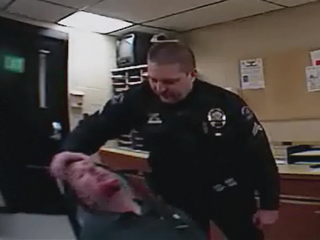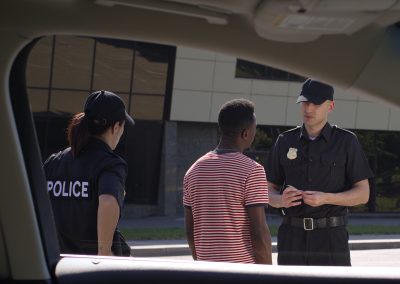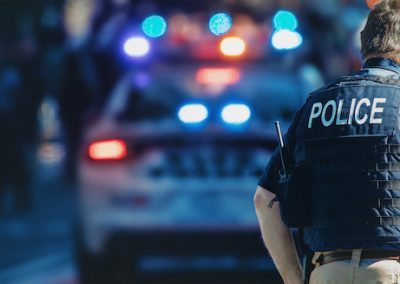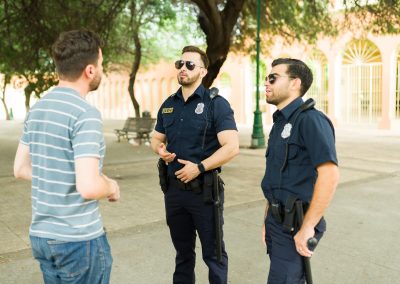Former-Cpl. Mark Magness of Federal Heights, Colo., police department is captured on bodycam viciously assaulting a prisoner. Would a better understanding of stress have prevented this?
“… 10 seconds of poor judgment can lead to: discipline, career derailment, depression, prison, and/or SUICIDE …” We show this on a PowerPoint slide during our Street Survival Seminar and ask officers to reflect on it momentarily. We follow up with this question: “How many of you know a former officer(s) who lost their jobs, went to jail, got divorced, or committed suicide over something that lasted 10 seconds or less?” Unfortunately the number of hands that raise is astonishing.
Recently released video from Federal Heights will (and should) aggravate every police officer in America. With the scrutiny we’re under, this only gives fodder to those pointing fingers at the profession. When one of ours commits a crime or violates their oath action must be taken.
I commend the Federal Heights PD administration for immediately starting an internal investigation and promptly terminating this officer’s employment. Chief Karl Wilmes told members of the media: “The message is that this police department, and all police departments really, have a high degree of professional standards. When violations come to our attention we take those seriously.”
Kudos also to the Adams County DA for filing charges and forcing Magness to take a plea deal.
So let’s look at the facts of this case.
It all began when officers were dispatched to a liquor store after a clerk refused to sell liquor to an intoxicated subject, who, prior to leaving the liquor store, threw a bottle at the clerk, causing the clerk to suffer a laceration. A short time later the suspect was apprehended and a confrontation occurred between the suspect and the police. Eventually handcuffed, he was transported to the police department.
The Video
Local media outlets are reporting that Magness told his supervisors as he was leading the handcuffed suspect to a booking area he “stumbled into [a] refrigerator.” The cut suffered from the “stumble” would later require stitches at a nearby hospital to close a gash on his chin.
Once inside the booking area, the suspect was uncuffed and placed in a holding cell as Magness shouted obscenities at him. During the altercation in the cell, the suspect can be seen raising his hands towards Magness, possibly preparing to hit the officer.
According to prosecutors, Magness struck the suspect seven times while on a bench in the holding cell. He’s hit another five times after he’s dragged to the floor and handcuffed again. Audio and video from the other officer’s bodycam show him trying to calm down Magness as he throws a restraint chair across the room.
Magness replies, “F*** that, f*** that.” Once the suspect is thrown into the restraint chair, Magness applies pressure to his head and temple. The suspect can be heard screaming in pain as Magness pushes deeper into pressure points under his chin and left eye. “You didn’t mean to swing at me? Cool!” Magness said to the man sarcastically. “I didn’t mean to bust your face up either.”
Magness is heard on body camera telling the suspect, “You picked the wrong cop to fight with, man. I can tell you THAT right now!” Magness can be heard telling his supervisor, “Yeah, I busted him up. … I take full responsibility.”
According to media reports, later that night, Romero told his supervisor that “it didn’t look good” and a sergeant would “probably have to review the tapes.”
The Stress Affect
What causes an officer to act in such a manner? I believe it is for one of two reasons:
- Violent temperament that should have precluded them from being accepted into the profession. They are brutish louts, always have been and always will be.
- Stress, which I believe accounts for most of the unacceptable behavior that does occur in our profession.
What causes an officer to make these career-ending mistakes?
A misunderstanding of, and the inability to control, STRESS.
The bottom line is that most people, including police officers, don’t understand stress. They are unprepared for it and when it happens they don’t know how to respond. They do one of two things: overreact or underreact.
We talk about this in great detail during our Street Survival Seminars. In fact, the entire two-day course is built on the foundation of understanding real stress.
Just as you tactically prepare for scenarios on the street, you should prepare for stressful encounters like you see in this video. If you have taken one of our classes, you are familiar with “when/then” thinking, or mental preparation: “When a suspect does this, then I’ll do this.” Apply the same concept for these encounters.
It’s easier said than done. Here are a few tips for remaining in control.
Don’t take things personally: Most people who are yelling, screaming and verbally challenging you are not directing that at you, but what you represent. Yes, there are those who are personally upset with you. However the majority are mad at the uniform you wear or the situation they have gotten themselves into. Either way, what they think, say or believe doesn’t matter one iota. They don’t actually need an “attitude adjustment.” In fact if you believe that, then it’s you who needs to assess yours.
Understand the reality of stress: When you get “stressed out” you have the potential to become overly aggressive, verbally abusive and you’ll experience perceptual distortion and your cognitive abilities will deteriorate. Our biggest problem in law enforcement is that we don’t even address this in training. It certainly isn’t incorporated on a regular basis.
Be aware of your stress level and prepare yourself accordingly: Take proactive steps that can reduce stress on and off the job.
Be ready to help diffuse other officers and let them know that it’s OK for them to diffuse you: Be willing to step in and if necessary, physically remove another officer from a scene before it’s get out of control. Trust me, the officer will appreciate it—eventually.
Conclusion
As I said, stress is the foundation of the Street Survival Seminar. It absolutely has to be part of training which means it begins in the supervisory ranks. Administrations need to train themselves first, develop an understanding, and recognize the absolute importance of stress training. Besides learning how to handle stress in real life encounters, good trainers will be able to recognize those who have anger issues before they manifest on the street.
Media outlets are reporting that other officers acknowledged Magness had anger issues, and that sometimes a sergeant or other officers would have to step in to get him under control. Now the question is, why wasn’t something done about this?
Law enforcement has to stop the culture of reaction. As a profession we have to be more proactive. It’s the only way we will be able to evolve and effectively do our jobs.











0 Comments